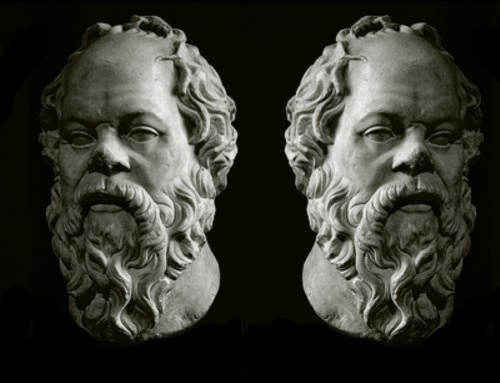Taking Drugs Seriously: The Reagans, Socrates, and Hypocrisies
No offense to Nancy or the U$ government cocaine-smuggling rings that thrived under the regime of her anti-communist ideologue of a husband, but drugs are endemic to life.

Psymposia is a 501(c)(3) nonprofit research and media organization that offers critical perspectives on drugs, politics, and culture. We rely on contributions from our readers and listeners. Your support is vital to sustaining Psymposia.
Support Psymposia’s independent journalism on Patreon and help us drive the Mystery Machine! We’re a bunch of meddling kids who are unmasking the latest shenanigans on the psychedelics beat.
Nancy Reagan famously said that we should say “yes” to life and “no” to drugs. She also said, teary-eyed when her husband died, that “Ronnie broke the mold”—a phrase that struck me because it would be more apt to say that Ronald Reagan was the mold—literally, he looked like a plastic doll, and his hair was as black and shiny as some unbreakable new DuPont polymer.
Just saying no may work—on paper, which arguably is also a drug, especially when combined with other plant products, such as the pine resin, wine, and walnut oil that have traditionally gone into ink. Now, luckily you are probably reading this online so you don’t have to worry that when I say “red house” or “Steve Jobs was a crypto-psychonaut who suggested LSD helped inspire him to invent the Apple personal computer” you won’t have to chastise yourself for being under the influence of unsolicited plant-based hallucinations.
Still, drugs—depending on how we define them—turn out to be surprisingly hard to avoid. Leave aside that anybody who’s hit adolescence has been flooded by an internal rush of body- and mind- changing hormones. In fact, this often starts long before adolescence, when male embryos get their first taste of male steroid hormones in the form of intrauterine testosterone, which scientists find they can gauge, strangely, long after by the relative length of your ring finger to your forefinger—the longer the ratio (and this applies also to girls) the greater your intrauterine exposure to that all-natural God given demon drug—also available on the black market, where it is implicated in the bulging muscles of athletes, not to mention early deaths and violent mood swings.
I also recently found out, to my budding feminist delight, that women in the second part of their cycle, after they ovulate, have a hormonal profile closer to men.
When I told a female friend that this so-called luteal phase was precisely the time when men were more likely to characterize women as bitchy, she responded (with a smile of satisfaction), “That explains a lot.”

No offense to Nancy or the U$ government cocaine-smuggling rings (Google the Iran-Contra scandal) that thrived under the regime of her anti-communist ideologue of a husband (and subsequent administrations), but drugs are endemic to life. Governments, nay, civilizations come and go but drugs remain.
No lesser a figure than Socrates called writing a pharmakon—ancient Greek for “drug,” and sharing the same root as our words for “pharmacy” and “pharmaceutical companies” (which, despite all their problems, for example the link between antidepressants and mass killings, Nancy likely was not including when she excoriated drugs as a category antithetical to “life”).
However, the great philosopher, who splits the history of philosophy in two—philosophers before him are known as pre-Socractics—did not “just say yes” to writing: his calling writing “a drug” comes from his equally famous student, Plato—you remember, the guy who described our world as a half-assed, fading copy of a true realm characterized by eternal Forms (which we simply perceived like slaves confined to the darkness of a cave). What was he on? Probably something besides wine and testosterone, for a start.
In any case, and not to get too far off into philosophy which is not everybody’s cup of tea…Plato writes in The Phaedrus that Socrates eschewed writing because it weakened the memory—not unlike weed and—without any possibility of us “just saying no”—aging. The “pharmakon” can be a remedy, an aid, a crutch, a cure—it can, like male steroids bought on the street, augment our natural capacities. But like any drug, which has some sort of augmentation, pain-killing, creativity-inducing, performance-enhancing or other desired effect, it also has a downside. For Socrates (according to Plato), the downside of writing was its destruction of memory.
Somewhat relatedly, I myself have noted that when I make a “mental note” to do something I am more apt to forget to do it—probably because I “remembered to remember” to do it without actually doing it. The problem with writing is similar—you can greatly expand your memory, putting things down on paper, storing them in files or electronic archives, but this information storage outside your brain may weaken your natural recall abilities. The “logic of the pharmakon”—of drugs which, like God in the Old Testament, both giveth and taketh away—can be seen in less “primitive” forms of technology. (Although I would argue that writing, in its pen-and-papery essence, is actually more sophisticated than some more recent variants, like Twitter.)
When pocket calculators came out, widely dispersed courtesy of Texas Instruments, parents worried their children would lose the ability to do multiplication and long division. (You could go back further in the history of nerds and say the same thing about the slide rule.) When TV became widespread in the 1950s (see Mad Men), parents—at least the few that weren’t watching soap operas and news shows—worried that their children’s ability to read and learn would suffer. Of course, they had a point—one that wasn’t foremost in Nancy’s mind when she pushed her simplistic nay-saying toward all mind-altering substances using the trippy, propagandistic medium of television (television being part of what she was on when she sanctimoniously spread the good word about just saying yes to life).

And of course now there’s the Internet. As was said by the coiner of the term “global village,” that is, by the early communications theorist and Canadian philosopher Marshall McLuhan, “the medium is the message.”
The speed of communication, the electronic crossing of distances, fleeting emotions transmitted by emoticons at the speed of light on emails, texts, and Facebook—all these have arguably—like some massive, planet-wide drug—shortened our attention span. (I have a theory that with the massive explosion of human population–doubling in the last fifty years and going from a global population that could fit in the state of Massachusetts only ten thousand years ago to the present seven odd billion of us–that ADD–an acronym for attention deficit disorder if you got distracted–is actually becoming normal: more people, multiple forms of media, electronic communication at the speed of light means less time for each message even as the biosphere takes on the form of what has sometimes been called a noosphere, a planetary realm of thought.
This reminds me of the strange fact that neanderthal brain cases are actually bigger than ours–intelligence as processing power needn’t evolve towards a maximum at the individual level when advantages of group communication begin to outweigh individual cogitation.)
Socrates, who apparently just said no to writing, may have been right. Memory-enhancing aids, even ones you don’t take into your body, can have deleterious, even permanent side-effects. And yet what culture wants to get rid of writing—or testosterone or estrogen for that matter?
For better or worse, every culture has its drugs; and in some cases, such as the development of the embryo, there is no option to not take them. Drugs can be defined narrowly, as Nancy Reagan apparently did when she accused anybody of smoking pot as an accomplice to murderous drug dealers. Or they can be defined realistically, as part of a general phenomenon of life—extending arguably to the innovations of technology—that have both negative and positive effects—and which are at play even in the bodies and worlds of the biggest would-be nay-sayers (actions speaking louder than words). Like many, Nancy Reagan was paying too much attention to religion, ideology, platitudes and politics.
Scientifically, drugs are chemicals which, when ingested, have a physiological effect. They exist on a continuum that includes hormones, remedies, and even foods. The turmeric in your Dijon mustard is an anti-inflammatory, like aspirin or Motrin. Too little water can kill you but so can too much. Although his prose style and long name–Philippus Aureolus Theophrastus Bombastus von Hohenheim–the Swiss botanist and alchemist more commonly known as Paracelsus, had a point when he said, “All things are poison and nothing is without poison; only the dose makes a thing not a poison.”: depending on context or dose (let alone impurities), the same drug can be beneficial or deleterious.
The blanket statement that all drugs are bad is not only ridiculous; it is philosophically incoherent and ecologically dangerous: ultimately drugs are the bodies of organisms of other species, all of which have been evolving on this planet for as long as we have.
Hey! Before you go… Psymposia is a 501(c)(3) non-profit media organization that offers critical perspectives on drugs, politics, and culture. We strive to ask challenging questions, and we’re committed to independent reporting, critical analysis, and holding those who wield power accountable.
Our perspectives are informed by critical analysis of the systemic crises of capitalism that have directly contributed to the unmitigated growth of addiction, depression, suicide, and the unraveling of our social relations. The same economic elite and powerful corporate interests who have profited from causing these problems are now proposing “solutions”—solutions which both line their pockets and mask the necessity of structural change.
In order for us to keep unpacking these issues and informing our audience, we need your continuing support. You can sustain Psymposia by becoming a supporter for as little as $2 a month.
Dorion Sagan
Dorion Sagan is an American author, essayist, fiction writer, and theorist from Madison, Wisconsin. He has written and co-authored books on culture, evolution, and the history and philosophy of science, including Cosmic Apprentice, Cracking the Aging Code, and Lynn Margulis: The Life and Legacy of a Scientific Rebel. Sagan is the son of astronomer Carl Sagan and biologist Lynn Margulis.





